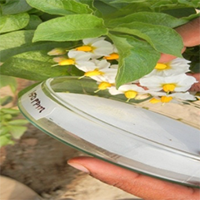Hybrid true seed production from potato mother plant as influenced by nitrogen splitting and boron

Submitted: September 14, 2019
Accepted: February 25, 2020
Published: June 16, 2020
Accepted: February 25, 2020
Abstract Views: 755
PDF: 448
Publisher's note
All claims expressed in this article are solely those of the authors and do not necessarily represent those of their affiliated organizations, or those of the publisher, the editors and the reviewers. Any product that may be evaluated in this article or claim that may be made by its manufacturer is not guaranteed or endorsed by the publisher.
All claims expressed in this article are solely those of the authors and do not necessarily represent those of their affiliated organizations, or those of the publisher, the editors and the reviewers. Any product that may be evaluated in this article or claim that may be made by its manufacturer is not guaranteed or endorsed by the publisher.

 https://doi.org/10.4081/jbr.2020.8563
https://doi.org/10.4081/jbr.2020.8563



